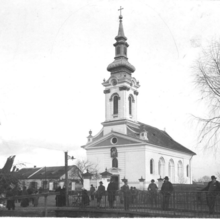Church of St. Elijah, Timișoara
The Church of St. Elijah (Romanian: Biserica Sfântul Ilie) is a Romanian Orthodox church located at 12 Andrei Șaguna Street, Timișoara, Romania. It is dedicated to the Prophet Elijah.
.jpg.webp)

Origins
The church is located in the Fabric neighborhood. In 1818, the city's Romanians, then under the ecclesiastical tutelage of the Serbian Orthodox Church, were granted the right to build their own church by the royal court in Vienna. Construction took place from 1825 to 1826. In 1909, as a result of the widening of the Bega Canal, the authorities decided to demolish the church, which stood in the way. This took place in 1913. In 1928, a memorial cross was placed on the site of the altar.[1]
Concurrently, the city donated a nearby plot of land for the building of a new church, as well as 60 thousand kronen. Several authors cite László Székely as the architect, but records of the parish council indicate this was Ioan Niga. Construction began in May 1911. The exterior was completed the following year, while the interior was ready in July 1913. A provisional consecration took place in October. The first repairs, targeting the leaky roof, occurred after 1928, with a formal consecration coming in 1936.[1]
Description and subsequent history
The church measures 19.9 by 25.7 meters, rising to a height of 26.3 meters. It takes the form of a Greek cross. The Sibiu Orthodox Cathedral served as a model.[2] Ioan Zaicu led the mural painting of 18 frescoes depicting saints and Biblical scenes, as well as 38 iconostasis icons. Nestor Bosioc was responsible for carving the iconostasis and other woodwork. A fire in 1935 seriously damaged some of the painting, prompting repair work.[3][4]
In the interwar period, the church was the spiritual center of Timișoara's Romanian Orthodox community, hosting a number of events. In 1919, after the city came under Romanian administration, the Romanian Army troops stationed there were blessed in front of the church. Patriarch Miron Cristea celebrated the Christmas liturgy there in 1929, while King Carol II attended a service in 1931.[1]
The church is listed as a historic monument by Romania's Ministry of Culture and Religious Affairs.[5]
| Wikimedia Commons has media related to Biserica ortodoxă Sfântul Ilie din Fabric. |
Notes
- (in Romanian) History at the parish site
- (in Romanian) Ovidiu Cosma, Architecture at the parish site
- (in Romanian) Iconostasis at the parish site
- (in Romanian) Painting at the parish site
- (in Romanian) Lista Monumentelor Istorice 2010: Județul Timiș Archived 2018-12-15 at the Wayback Machine